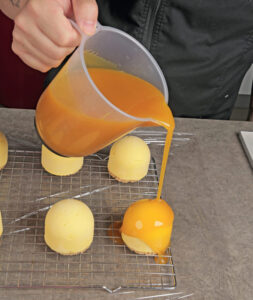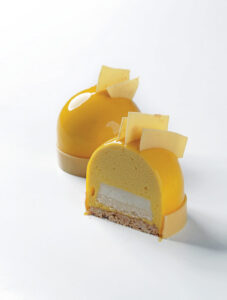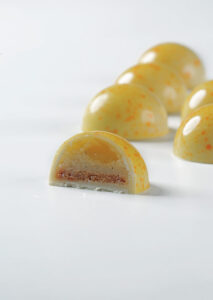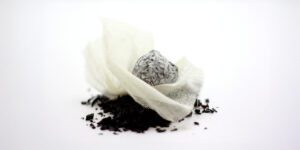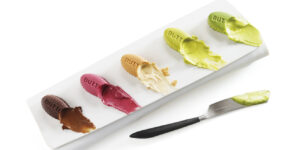Categories Pastry Chef Articles
Toni Rodríguez: “I was one of the pioneers in making vegan pastries. I think about it now and it’s crazy, I’m not that old”
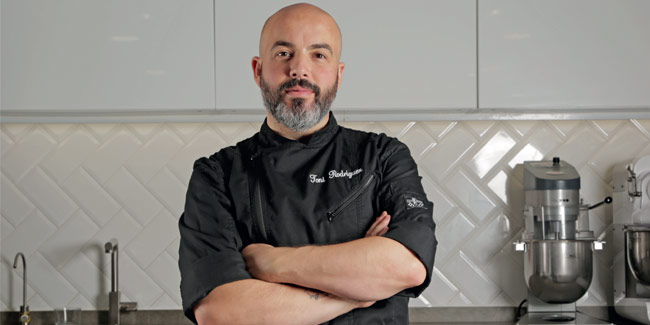
In 2018, Toni Rodríguez opened his own school in Spain, focused on vegan pastry training. It was the fruit of 14 years of dedication, research, and development of a type of creation in which he turned out to be a true pioneer, we all remember him from his Lujuria Vegana. Although nowadays we are increasingly familiar with a range of ingredients and techniques that allow us to avoid apparently fundamental ingredients of the classic recipe book, such as eggs, cream, or butter, just over 10 years ago it was a real chimera to consider many creations that could avoid them. Four years after the opening, Toni Rodríguez is happy with the trajectory of his academy and with the great demand of students from all over the world interested in receiving his classes. He is also satisfied with the balance of his book on vegan pastry, which in less than a year is already about to reach its second edition and has already been commissioned for translations into English and German. Perhaps one of the subjects to improve within his balance is the interest that local professionals, or even national companies, show for what Toni Rodríguez and his school can offer them.
Can you remind us of the priorities of Toni Rodríguez Academy?
What we say in school, especially to the students of the contemporary intensive course, is: why are we vegan? Well, because we think it’s what’s best for animals, period. They have the same capacity to suffer as we do, so why do we have to kill them? If we always talk about how bad it is to be sexist, homophobic, etc., our attitude towards animals can’t be any less. And two: the priority is flavor.
Flavor before aesthetics?
I see that a pastry for connoisseurs is often proposed. Pastry has to be for the general public, it’s lazy to do the opposite! Pastry has to be delicious, but we sin by making everything too sweet, I don’t see it that way. When they tell me that people expect sweet things, I say that it’s not true. What is not so sweet, but rather borderline, can be very successful. And you want to eat another one, or you want to keep trying more things. At the end of the intensive course on contemporary pastry, the participants taste everything. And after they have, I always point out to them that they have not had to drink water because when something is very sweet, what you want to do is drink water.
“Pastry has to be delicious, but we make it all too sweet, I don’t see it that way”
Sometimes the prejudice against vegan pastry comes precisely because it seems excessively sweet, perhaps to hide possible deficiencies.
Sure, but that’s not the real reason, it’s because of a lack of knowledge. If you stop to think about it, it is normal that vegan pastry isn’t entirely good because it is something new. What is not normal is that in traditional pastry there are still so many things that are bad. When something vegan is bad, I tell them it’s normal because a lot of knowledge is lacking, a lot of development is lacking. But when traditional pastry is made badly despite the schools and books that exist… for me that is unforgivable. But with something vegan that is not quite rich, it’s logical, you have to give it time.
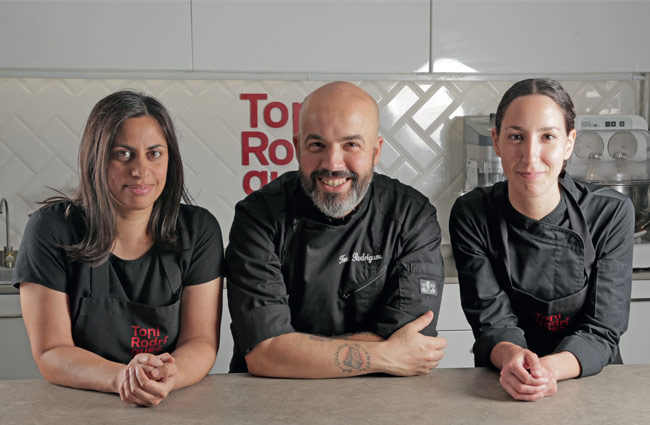
Is it also necessary to break cultural roots with ingredients such as cream, eggs, or butter?
Are you sure there are roots with butter? Not here. The thing is, everyone mentions it because you have Frenchified yourselves. We have more roots with lard, with margarines, but we always talk about butter.
“It is normal that vegan pastry is not entirely good, because it is something new, you have to give it time. What is not normal is that in traditional pastry there are still so many bad things”
But when you try a truffle, do you associate the dairy flavor with chocolate?
Of course. But for me it’s simple, when you taste a praline, do you look for the milky taste? No, you’re looking for the nut flavor. Even in a praline cream too. And instead, they always taste like dairy.
It can happen with fruit, in a dessert you always expect the mix with a dairy
It doesn’t make sense to me. I think about it and I don’t understand it. Why does a mango mousse have to taste like cream? They tell me that vegan pastry tastes like coconut and I answer: yes, but the traditional one tastes like cream. And they tell me that they like cream; and I answer “and I like bread with tomato, don’t tell me about what you like”. It’s like what’s happening now with the donut where they’re putting butter in it, but a donut traditionally doesn’t have butter. It is rare that you go to the United States and a donut tastes like butter, but here we have become French, if it doesn’t have butter it seems like it’s wrong.
There are many fats that are considered low quality because they are trans or hydrogenated.
But what is a low quality product? Let me first say that I do not use trans or hydrogenated fats. But now it turns out that we no longer call a product margarine we call it vegetable butter because it’s cool and just for the sake of selling something, we change its name. But that’s cheating because in the end a margarine is an inverse emulsion with an unsaturated oil, water, and an emulsifying agent, more salt, perhaps vitamins, due to nutritional value… and there are those who accuse it of being hydrogenated. When there are plenty of celebrity chefs using ersatz chocolate for frosting that contains hydrogenated fats. They don’t question it because a traditional pastry chef never reads the ingredients. I am a vegan, so I have to read the ingredients of all the products. But the thing is that I have nothing against hydrogenated fats. That we are making pastries, if we compare the nutritional value of a fruit with respect to a dessert, that there is nothing to do, for me that’s all a lie. The nutritionist is the one who has to say if a food is healthy or not, if you know that a dessert is a treat, nothing happens. When you have to look for the fiber content in a cake, you have a problem.
“The nutritionist is the one who has to say if a food is healthy or not, if you know that a dessert is a treat, nothing happens. When you have to look for the fiber content in a cake, you have a problem”
Isn’t the use of certain fats a problem in quality pastry?
Everything we do at the Academy is water-based and with neutral fats. If we work with a fat that is not neutral, it is because we seek its flavor, as in the case of cocoa butter and extra virgin olive oil. The rest is neutral fat. On the other hand, in traditional pastries you eat a creamy chocolate and it tastes like butter. A lemon cream from a tart tastes like butter, egg, and lemon. And why do you call it lemon curd if it tastes like butter and egg first? Look, I am more Catholic than the pope, I have been speaking for many years. If someone tells me that they use this or that product, I tell them that their product will taste like this and that product.
How do you see the evolution of vegan pastry in the last five years, being one of the pioneers?
It’s amazing. I was one of the pioneers in Europe. I think about it now and it’s very crazy, I’m only 36 years old, I’m not that old. And I started in 2005 and there was nobody in Europe doing vegan pastry. That’s where you realize how incipient everything is. I was talking about it with a girl from France and she told me, “you didn’t create the vegan macaron”, and I replied “did you know what vegan was in 2010?” Her answer: “No”. Well, I was already making vegan pastry then and on top of it I created the vegan macaron in 2010. For her, I’m Spanish, I’m young, and I’m vegan, and what I said didn’t make sense to her. In the end you realize that everything is very recent despite the fact that I have been here for many years. But it is incredible how in five years everything has changed and there is a huge demand. If in 2011 we were already selling like crazy in Lujuria Vegana, imagine now. They tell me to open something, but I want to live.
“It is incredible how in five years the demand has grown, everything is very recent but I have been in this for many years and I am not that old”
Does the industry seem very interested in the phenomenon?
Yes, but it’s still missing a lot, because it’s like they’re making vegan products for vegan people. But what I want is to make vegan products for everyone.
If we look at the ingredients you use, it seems that you attach a lot of importance to olive oil.
When I prepare cakes or biscuits I like to use a rather fruity olive oil, the Arbequina type. I look for another option if it is croissant or brioche or donut. Now there is a company called Aceite de Jaén with which we have made a pack of the six virgin olive oils that seem best for use in pastry. We have oils with the varieties arbequina, picual, royal, hojiblanca, and more. All of them are very good, but since we come from a culture in which we consume oil in a bad way, pastry with olive oil is viewed with skepticism. When we incorporate it into a dessert, they tell me, “it’s going to be a lot of olive oil”. It depends on the amount, because just like if you add butter to a dessert, and if it’s bad butter, that’s what the dessert will taste like. For example, what we think of with the MMAPE chocolate, which we now also do in individual format, has a lot of olive oil. It is a white chocolate praline without white chocolate, for me it was very cool to get a jury prize in this category.
In vegan pastry, is it important to make your own ingredients, margarines, chocolates, and more?
Yes, you can make your own white or milk chocolate. We explain it at the school but we don’t do it live because a machine running all day is a pain. There’s nothing special about it. We explain a lot the theory of the ingredients and the technology of all the creations that we carry out. But we don’t teach it live.
Actually, why would I do that if there are already interesting products? In traditional pastry, people don’t make their egg, their butter, or their chocolate. Why is it that in vegan pastry I have to make everything? I teach it, but I also teach them to question that. Be careful, we are at a time when if you become vegan you cannot buy margarine, you have to make it at home. Why, why is industrial bad? No, that is lack of knowledge, that is ignorance. There is a very good industrial product, without hydrogenated fats, since 2008, no trans fats. Master Martini was the first to bring it out and time has passed since then.
What do you think of the discourse that focuses everything on using natural ingredients?
Why is a dye not good, what dose is not good? We always sell the idea that the word natural is good, but it is a topic that I no longer go into. I don’t because I’m a “hater”. It’s like when they say “pastry without dyes or with natural dyes”. Okay, but what if what you’re selling is a sugar and fat bomb? It is deceptive marketing, designed to hide. I am very much a “hater”. When I see a chocolate announcing “no sugar added”, it does have sugar even if it’s natural, it’s sugar just the same. Where is the natural? Even in a juice the same thing happens, although there is no added sugar, it has sugar. It is not the same as eating an orange. I’m not criticizing chocolate, I’m simply giving the example that we go to one place because it’s fashionable, and when fashion changes, we’ll go to something else. But gastronomy is missing.
“It’s easy to make a potato protein macaron, the hard part was coming up with it”
Has the greater accessibility to certain types of ingredients facilitated the popularity of vegan pastries?
Well, the first thing to know is how to use those ingredients. Some people have told me that it is very easy to make vegan pastries with potato protein, but then, who was the first idiot to start using it? Everything is easy when they teach it to you. It’s easy to make a potato protein macaron, the hard part was coming up with it. In other words, no matter how many ingredients there are, you need to know how to use them. Now there is inulin, which I don’t use much. My biggest use would be potato protein for cakes. For example, in the contemporary face-to-face course, we teach how to make three types of alternatives to egg white, one with potato protein, another with soy, and another with pea… And before Sosa sold these products I had to buy 15-kilo bags of these products to test and elaborate. I had to order a bunch of plant proteins and try them all at a time when there was hardly any knowledge of vegan pastry. We have another very different but illustrative example with pectins, of which there are many and give a lot of scope. It is an ingredient that we have always had and perhaps hadn’t given enough value.
Have you done a lot of trial and error?
Trial and error and really studying, paying close attention to what you’re doing. Depending on how we use certain ingredients we can achieve amazing things. For example, with a lemon cream I use a thickener like a starch, because it gives me warmth. And then we always have to know the pre-crystallization temperature of the fat, so that the emulsion temperature is the most optimal. With a pectin or starch, the emulsion temperatures can be high, which helps us make the emulsion optimal. That knowledge, until you have that, is complex.
